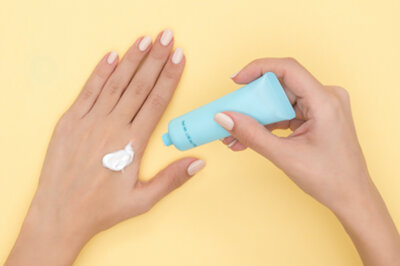Eczema (also known as dermatitis) is a condition where certain areas of your skin become itchy, dry, inflamed, red, cracked and rough.
It is a non-contagious skin condition and can affect people of all ages. There are numerous types of eczema, varying from mild to severe. According to the National Eczema Society, one in 12 adults in the UK suffers from eczema.
If you are an eczema sufferer, you will be all too aware of how unbelievably hard it is to resist the itch. However, by giving in to the urge to scratch, you can actually exacerbate your eczema. Some people may even scratch to the point they start to bleed, which can increase their risk of infection.
What triggers an eczema flare-up?
 Eczema triggers vary from person to person, and there are a number of things that can trigger eczema symptoms. Some common triggers include:
Eczema triggers vary from person to person, and there are a number of things that can trigger eczema symptoms. Some common triggers include:
- Irritants – including soaps, washing powder, shampoo, washing-up liquid and bubble baths.
- Environmental factors or allergens – such as cold and dry weather, dampness, house dust mites, pet fur, pollen and moulds.
- Food allergies – such as dairy, eggs, peanuts, soya or wheat.
- Certain fabrics – such as wool and synthetics.
- Hormonal changes – women may find their symptoms get worse in the days leading up to their period or during pregnancy.
- Stress - sudden or ongoing stress can also cause an eczema flare-up.
What treatments are available for eczema?
Topical corticosteroid creams and emollients: Initially, doctors will usually prescribe emollients for use during bathing and topical steroid creams, such as Betnovate.
Some eczema treatments that you can buy online from PrescriptionDoctor include:
- Eucerin Intensive is a moisturising lotion that hydrates dry skin by locking in moisture and replenishing the protective layer of oils on the skin's surface.
- Hydromol Bath and Shower Emollients are used to strengthen the outermost layer of the skin, locking in moisture.
- Eucerin Bath and Shower Oil helps calm and soothe dry skin to relieve itching.
Treatments for more severe cases of eczema include:
Systemic corticosteroids - If topical treatments are not effective, your doctor may prescribe systemic corticosteroids. These are either administered by injection or taken orally, but they are not intended for long-term use.
Antibiotics - These are usually prescribed if your eczema occurs alongside a bacterial skin infection.
Antihistamines - These can help relieve itching, and they have a sedating effect, which is helpful to stop you from scratching in your sleepy state. Non-drowsy antihistamines may also be available.
Phototherapy/light therapy - This involves exposure to ultraviolet (UV) light to help reduce eczema symptoms.
What can you do at home to help prevent flare-ups?
You can take the following steps at home to help prevent your eczema flare-ups:
- Ensure you use a moisturiser or emollient daily, especially after bathing, to seal in moisture. Throughout the day, if you feel that your skin is drying up or becoming itchy, reapply your moisturiser or emollient.
- When bathing, avoid using hot water, as it can irritate and dry out your skin. Stick to lukewarm water and gently pat your skin dry, rather than rubbing it.
- Use disposable gloves when you are at risk of coming into contact with irritants.
- Wear loose-fitting clothes made of natural materials and avoid synthetic fabrics.
If you feel like your eczema is getting worse and is interfering with your daily life, always see your doctor. You may need to be referred to a dermatologist—a professional who specialises in skin conditions.
It's a good idea to keep a diary to help identify your eczema triggers and notice any patterns. Things to make a note of include:
- What you eat and drink.
- What skin products, chemicals, soaps, make-up and washing powder you use.
- What activities do you do, for example, taking a walk outside in the woods or swimming in a chlorinated pool?
- How long do you spend in the bath or shower, and what temperature of water do you use?
- How often do you feel stressed and why?
Making these notes should help you begin to notice connections between your day-to-day activities and your eczema flare-ups. Bring this diary to your doctor appointments to help them pinpoint your triggers.
Your doctor can discuss your condition with you and suggest the most suitable treatment for you. This can range from suggesting a simple washing routine or over-the-counter skincare product to prescribing a specific course of treatment.
If a specific cosmetic product or medication is causing your condition, consult your doctor or pharmacist about alternative solutions. While you shouldn't stop taking prescribed medicine without permission from your doctor, you can discuss the side effects you experience with your doctor or a pharmacist. Following this discussion, your doctor may be able to change your medication or a pharmacist can suggest a treatment for your eczema or recommend alternative cosmetic products.
Living with eczema can also have an impact on your emotional well-being. It can make you feel anxious and embarrassed, and affect your confidence. It can also make you angry, frustrated or depressed, leaving you too upset to do your usual activities.
This stress can worsen your symptoms due to an increase in the stress hormone cortisol. At sufficiently high levels, cortisol can exacerbate inflammation in the body.
Please remember, if you are finding it difficult to cope with the psychological impact of eczema, you may need to consider finding extra support. Always speak to your doctor if you are struggling with your mental health - they can help put you in contact with appropriate support groups and organisations to help manage your mental health.
Summary
Eczema is a common skin condition characterised by red, itchy, and dry patches. While there is no single cure for eczema, various treatments can help reduce symptoms and improve overall skin health.
First, a daily moisturising routine is important for managing eczema flare-ups. A moisturiser that is specifically designed for use with eczema can help reduce dryness, redness, and itching.
Second, certain topical medications, such as corticosteroids or calcineurin inhibitors, can help reduce inflammation and itchiness. A doctor may recommend over-the-counter or prescription medications in more severe cases.
Third, some lifestyle changes, such as avoiding Known irritants (e.g. fragrances and detergents) and wearing cool, loose-fitting clothing, may help reduce symptoms. Eczema is a common skin condition that can be effectively managed and treated.
References
NHS, 2019. Atopic Eczema: Overview, Symptoms, Causes, Treatments, Complications.
British Association of Dermatologists (BAD), 2020. Atopic Eczema.







